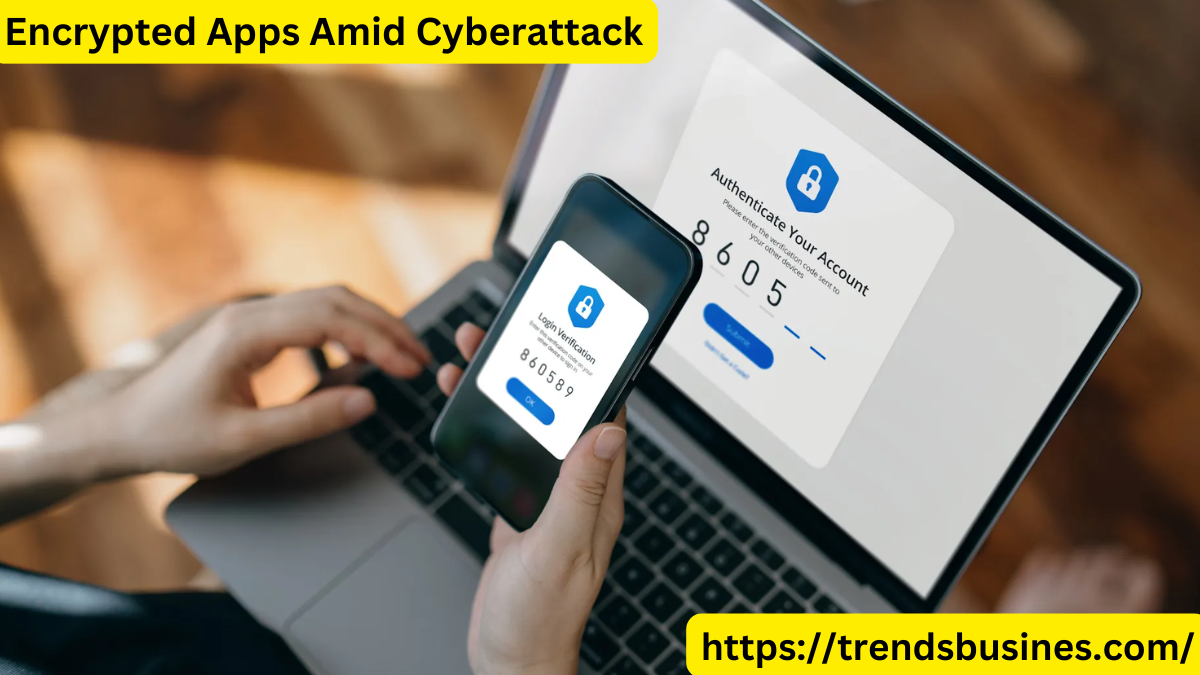In today’s rapidly evolving digital landscape, the rise of cyberattacks has created an urgent need for enhanced security measures, especially when it comes to safeguarding personal and sensitive information. One of the most effective ways to ensure that private data remains protected is through the use of encrypted apps. These apps provide a layer of security that prevents unauthorized access, ensuring that communications and data exchanges are only visible to the intended recipients. Amid increasing cyberattacks, encrypted apps have gained significant attention as an essential tool for maintaining privacy and mitigating the risks associated with digital threats.
The Growing Threat of Cyberattacks
Cyberattacks have become more frequent, Encrypted Apps Amid Cyberattack , and damaging in recent years. These attacks can come in various forms, such as phishing, ransomware, data breaches, and denial-of-service (DoS) attacks. Cybercriminals target individuals, businesses, governments, and institutions with the aim of stealing sensitive data, disrupting operations, or demanding ransom. The consequences of these attacks are far-reaching, resulting in financial losses, reputational damage, and loss of trust from customers and stakeholders.
The increasing dependence on digital platforms for communication, commerce, and work has expanded the attack surface for cybercriminals. As more personal and professional activities take place online, the volume of sensitive data being shared and stored has grown exponentially. This creates an opportunity for cyber attackers to exploit vulnerabilities in communication channels and data storage systems.
The Role of Encryption in Protecting Data
Encryption is a process that converts data into a form that can only be read or understood by those who possess the correct decryption key. It is a critical aspect of modern cybersecurity, providing a secure way to protect data from unauthorized access. When it comes to encrypted apps, encryption ensures that any data transmitted or stored within the app is unreadable to anyone who doesn’t have the proper credentials or decryption key. This protects the privacy of individuals and organizations alike.
The primary goal of encryption is to safeguard data confidentiality. By using strong encryption algorithms, such as AES (Advanced Encryption Standard) or RSA (Rivest-Shamir-Adleman), encrypted apps can protect data in transit (during communication) and data at rest (when stored). This means that even if cybercriminals intercept communications or gain access to a server where data is stored, the data will be unreadable and unusable without the decryption key.
In the context of encrypted messaging apps, for example, encryption ensures that only the sender and the recipient can read the content of the messages. This prevents hackers, government surveillance programs, or third-party entities from accessing sensitive conversations.
Encrypted Apps: A Critical Tool Amid Cyberattacks
As cyberattacks continue to grow in sophistication, encrypted apps are becoming an essential tool for maintaining privacy and security. These apps are designed to offer secure communication channels and protect data in real time. Encrypted messaging apps, for instance, use end-to-end encryption (E2EE), a form of encryption that ensures that only the sender and receiver of a message can decrypt and read it.
End-to-end encryption eliminates the possibility of a third-party, such as a service provider or hacker, accessing the contents of the communication. This has made encrypted messaging apps, like Signal, WhatsApp, and Telegram, incredibly popular among users who are concerned about privacy. The increased adoption of such apps is a direct response to the growing threat of cyberattacks and the need for secure communication.
Beyond messaging apps, encrypted apps are used in a variety of other contexts, including email services, file storage, and even banking. For example, encrypted email services like ProtonMail ensure that users’ email communications are private and protected from unauthorized access. Similarly, encrypted file storage apps, such as Tresorit and Sync.com, provide users with the ability to securely store and share files, knowing that only authorized individuals can access them.
The Advantages of Encrypted Apps Amid Cyberattacks
One of the key advantages of using encrypted apps is the peace of mind they provide. In an era where cyberattacks are increasingly common, users can feel more confident knowing that their data is protected by strong encryption. This is particularly important for individuals who use their devices to store sensitive information, such as financial details, personal communications, and confidential work documents.
Encrypted apps also help maintain the integrity of digital communications. By ensuring that data cannot be altered or tampered with, these apps prevent cybercriminals from manipulating information for malicious purposes. This is especially important for businesses that rely on secure communication and data sharing to conduct operations and protect proprietary information.
Moreover, the use of encrypted apps fosters trust between users and service providers. When users know that their communications and data are being protected by strong encryption, they are more likely to engage with digital services and platforms. This trust is crucial for the growth of online businesses and digital platforms, as customers are more likely to share personal and financial information when they feel confident in the security measures in place.
The Challenges and Limitations of Encrypted Apps
Despite the many benefits of encrypted apps, they are not without their challenges. One of the main concerns is that encryption can sometimes be seen as a double-edged sword. While encryption is vital for privacy and security, it can also be used by criminals to hide illicit activities. For example, cybercriminals may use encrypted messaging apps to coordinate illegal actions without fear of being intercepted by law enforcement.
This has led to a heated debate about the balance between privacy and security. Governments and law enforcement agencies argue that they need access to encrypted communications in order to prevent criminal activity, while privacy advocates insist that encryption is a fundamental right and that any backdoors or vulnerabilities introduced to enable surveillance could be exploited by malicious actors.
Another limitation of encrypted apps is that they may not be foolproof. While encryption can make it difficult for hackers to access data, it does not guarantee absolute security. Vulnerabilities in app design, weak passwords, or user error can still lead to security breaches. As such, users must remain vigilant and adopt good security practices, such as enabling two-factor authentication and using strong, unique passwords.
The Future of Encrypted Apps in a World of Cyberattacks
As cyberattacks continue to evolve, encrypted apps will remain a crucial component of the digital security landscape. The development of more advanced encryption techniques, combined with better user awareness and education, will help to strengthen the effectiveness of these apps in protecting data and communications.
However, the growing pressure from governments and law enforcement agencies to weaken encryption in the name of national security Encrypted Apps Amid Cyberattack poses a significant challenge. The future of encrypted apps will likely be shaped by ongoing debates surrounding privacy, security, and the balance between individual rights and public safety.
In the coming years, we can expect to see more innovations in encrypted app technology, including the use of quantum encryption, which promises to provide even stronger protection against cyberattacks. As cyber threats continue to become more sophisticated, the role of encrypted apps in safeguarding personal and sensitive information will only become more important.
Conclusion
Encrypted apps have emerged as a vital tool in the fight against cyberattacks, providing users with the ability to protect their data and communications from unauthorized access. As cybercriminals continue to evolve their tactics, encrypted apps offer a secure line of defense against digital threats. However, the debate over the balance between privacy and security remains a challenge that will shape the future of encrypted technologies. Ultimately, the continued development of encryption techniques and the adoption of best security practices will be essential in ensuring that encrypted apps remain an effective and trusted solution in the face of ever-growing cyber threats.


